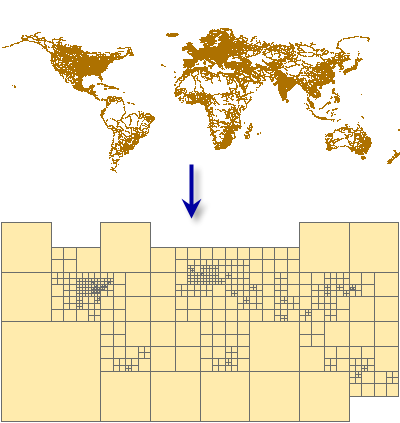Summary
Creates a mesh of polygon features that cover the input feature class where each polygon encloses no more than a specified number of input features, determined by the density and distribution of the input features.
The resulting partition feature class is ideally suited for the Cartographic Partitions geoprocessing environment setting. The Cartographic Partitions environment setting dictates to certain generalization or conflict-resolution geoprocessing tools to load and process input features by partition. These tools operate contextually, meaning that multiple features, possibly from multiple themes, must be loaded simultaneously. Memory limitations are encountered with large datasets. Partitioning allows large datasets to be processed by these tools in portions sequentially.
Illustration

Usage
This tool creates a polygon feature class designed to be used in the Cartographic Partitions geoprocessing environment setting. Tools that honor this environment setting process input features in portions defined by the partition polygons to avoid exceeding memory limitations. The following tools honor the Cartographic Partitions environment setting:
- The Aggregate Polygons tool
- The Collapse Road Detail tool
- The Delineate Built-Up Areas tool
- The Detect Graphic Conflict tool
- The Merge Divided Roads tool
- The Resolve Building Conflicts tool
- The Resolve Road Conflicts tool
- The Thin Road Network tool
Input features should correspond to the features that you intend to process together for multiscale display. For example, if you intend to use the Thin Road Network tool to process a feature class containing streets together with another containing highways, enter both of these as inputs to the Create Cartographic Partitions tool to create partitions that are relevant to the distribution and density of both datasets considered together.
Syntax
CreateCartographicPartitions_cartography (in_features, out_features, feature_count)
| Parameter | Explanation | Data Type |
in_features [in_features,...] | The input feature classes or layers whose feature distribution and density dictate the size and arrangement of output polygons. The input features are typically destined for subsequent processing with contextual generalization or conflict resolution geoprocessing tools. Typically, the input features, when considered simultaneously, would exceed memory limitations of generalization or conflict-resolution geoprocessing tools, so partitions are created to subdivide inputs for processing. | Feature Layer |
out_features | The output polygon feature class of partitions, each of which encloses a manageable number of input features not exceeding the number specified by the Feature Count parameter. | Feature Class |
feature_count | The ideal number of features to be enclosed by each polygon in the output feature class. The recommended count is 50,000 features, which is the default value. The feature count cannot be lower than 500. | Long |
Code sample
CreateCartographicPartitions tool example (Python window)
The following Python window script demonstrates how to use the CreateCartographicPartitions tool in immediate mode.
import arcpy
from arcpy import env
env.workspace = "C:/data/cartography.gdb/transportation"
arcpy.CreateCartographicPartitions_cartography("roads.lyr", "partitions", "50000")
Environments
Licensing information
- ArcGIS Desktop Basic: No
- ArcGIS Desktop Standard: No
- ArcGIS Desktop Advanced: Yes
Related topics
- An overview of the Generalization toolset
- Understanding conflict resolution and generalization
- Automating conflict resolution and generalization workflows with geoprocessing
- Aggregate Polygons
- Thin Road Network
- Merge Divided Roads
- Resolve Road Conflicts
- Resolve Building Conflicts
- Generalizing large datasets using partitions
- Cartographic Partitions (environment setting)
- Delineate Built-Up Areas
- Collapse Road Detail
- Detect Graphic Conflict